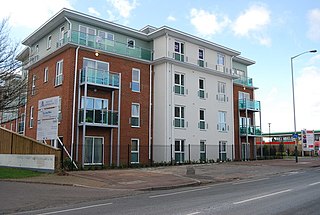
Such terms depending on the country could also refer to any rental housing that may be owned and managed by the state, by nonprofit organizations, or by a combination of the two, usually with the aim of providing affordable housing. Social housing is generally rationed by a government through some form of means-testing or through administrative measures of housing need. One can regard social housing as a potential remedy for housing inequality.

In Ireland and the United Kingdom, housing associations are private, non-profit making organisations that provide low-cost "social housing" for people in need of a home. Any budget surplus is used to maintain existing housing and to help finance new homes and it cannot be used for personal benefit of directors or shareholders. Although independent, they are regulated by the state and commonly receive public funding. They are now the United Kingdom's major providers of new housing for rent, while many also run shared ownership schemes to help those who cannot afford to buy a home outright.

Ballymun is an outer suburb of Dublin, Ireland, at the northern edge of the Northside, the green-field development of which began in the 1960s to accommodate a housing crisis in inner city areas of Dublin. While the newly-built housing was state-of-the-art at the time, comprising high-rise tower blocks and flat complexes, residents were moved in years before shops, schools and other infrastructure were fully ready, and the area became well known for both a strong community spirit and considerable social challenges. Ballymun has several sub-districts such as Sillogue, Coultry, Shangan and Poppintree, and is close to both the Republic of Ireland's only IKEA store and to Dublin Airport. The area is the source of one Dublin river, and parts lie in the floodplain of another, and there are a number of parks.

A housing cooperative, or housing co-op, is a legal entity, usually a cooperative or a corporation, which owns real estate, consisting of one or more residential buildings; it is one type of housing tenure. Housing cooperatives are a distinctive form of home ownership that have many characteristics that differ from other residential arrangements such as single family home ownership, condominiums and renting.
A tenant management organisations (TMO) is an organisation set up under the UK Government's Housing Regulations 1994, which allow residents of council housing or housing association homes in the UK to take over responsibility for the running of their homes.

Grant Shapps is a British politician who has served as Secretary of State for Transport since 2019. Shapps also has Cabinet responsibility for the Northern Powerhouse. A member of the Conservative Party, he has been the Member of Parliament (MP) for Welwyn Hatfield since 2005.
The Right to Buy scheme is a policy in the United Kingdom which gives secure tenants of councils and some housing associations the legal right to buy, at a large discount, the council house they are living in. There is also a Right to Acquire for assured tenants of housing association dwellings built with public subsidy after 1997, at a smaller discount. By 1997 over 1,700,000 dwellings in the UK had been sold under the scheme since its introduction in 1980, with the scheme being cited as one of the major factors in the drastic reduction in the amount of social housing in the UK, which has fallen from nearly 6.5 million units in 1979 to roughly 2 million units in 2017, while also being credited as the main driver of the 15% rise in home ownership, which rose from 55% of householders in 1979 to a peak of 71% in 2003.
Housing Benefit is a means tested social security benefit in the United Kingdom that is intended to help meet housing costs for rented accommodation. It is the second biggest item in the Department for Work and Pensions' budget after the state pension, totalling £23.8 billion in 2013–14.

The Clays Lane Estate was a housing estate in Stratford, East London, and the UK’s largest purpose built housing cooperative. It was an experiment in building close-knit communities as a way of helping vulnerable single people. It became the subject of significant controversy when it was demolished to make way for the site of the London 2012 Olympic games.
The Tenant Services Authority (TSA) was the operating name of the Office for Tenants and Social Landlords, the former regulatory agency of registered providers of social housing in England.
Eco-towns are a government-sponsored programme of new towns to be built in England, which are intended to achieve exemplary standards of sustainability.

Homes England is the non-departmental public body that funds new affordable housing in England. It was founded on 1 January 2018 to replace the Homes and Communities Agency (HCA).

Empty dwelling management orders (EDMOs) are a legal device used in England and Wales, which enable local authorities to put an unoccupied property back into use as housing. EDMOs were created by the Housing Act 2004, with the relevant legislation coming into effect in mid-2006; in the three and a half years to the end of 2010, however, only 43 had been issued.

Kensington and Chelsea TMO (KCTMO) was the largest tenant management organisation (TMO) in England, managing nearly 10,000 properties on behalf of Kensington and Chelsea London Borough Council – the entire council housing stock in the Royal Borough of Kensington and Chelsea.
Hulme Crescents was a large housing development in the Hulme district of Manchester, England. It was the largest public housing development in Europe, encompassing 3,284 deck-access homes and capacity for over 13,000 people, but was marred by serious construction and design errors. Demolition of The Crescents began in 1993, 21 years after it was constructed in 1972.

Rent regulation is a system of laws, administered by a court or a public authority, which aims to ensure the affordability of housing and tenancies on the rental market for dwellings. Generally, a system of rent regulation involves:
One Housing Group is a housing association based in London and the south east of the United Kingdom. They manage 16,000 homes and provide support to residents who needs special help, through their social care arm, One Support. As of 2015-16, they had an annual turnover of £255m and employed ~1800 staff.

Public housing provided the majority of rented accommodation in the United Kingdom until 2011 when the number of households in private rental housing surpassed the number in social housing. Houses and flats built for public or social housing use are built by or for local authorities and known as council houses, though since the 1980s the role of non-profit housing associations became more important and subsequently the term "social housing" became more widely used, as technically council housing only refers to housing owned by a local authority, though the terms are largely used interchangeably. Before 1865, housing for the poor was provided solely by the private sector. Council houses were built on council estates, where other amenities, like schools and shops, were often also provided. From the 1950s, blocks of flats and three-or-four-storey blocks of maisonettes were widely built, alongside large developments of terraced housing, while the 1960s and the 1970s saw construction of many high-rise tower blocks. Flats and houses were also built in mixed estates.

The Anti-Social Behaviour, Crime and Policing Act 2014 is an Act of the Parliament of the United Kingdom that consolidated and expanded law enforcement powers in addressing anti-social behaviour. One significant aspect of the act is that it replaced anti-social behaviour orders, the primary civil order in the United Kingdom since 1998, with criminal behaviour orders.

Great British Railways (GBR) is a planned state-owned public body that will oversee rail transport in Great Britain from 2023. The organisation will replace Network Rail as the operator of rail infrastructure, and will also control the contracting of train operations, the setting of fares and timetables, and the collection of fare revenue in most of England. The concession contract system will replace the previous system of passenger rail franchising in Great Britain run by the Department for Transport, which collapsed in 2020 during the COVID-19 pandemic.












